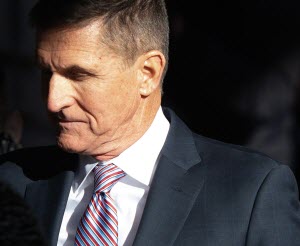Trump Purging Whoever Challenges His Administration
Last July, immediately after Robert Mueller’s feckless performance before Congress laid to rest his report two years in the making, Donald Trump declared to an audience of young people, “I can do anything I want as president of the United States”. He set about employing that doctrine the very next day with the call to the Ukrainian president that led to his impeachment and went on to expand its scope. He ordered the White House to turn over not a single document to Congress in the impeachment proceedings, disallowed anyone from his administration to testify (a few defied that order), and straight-armed all attempts by Congress to exercise its constitutional role of oversight of the executive branch.
Lately he has decided there should be no oversight within his administration, either. He has now fired the inspectors general of four departments, the latest — once again under cover of a Friday night, at odds with braggadocio about his power — being Steve Linick, the IG of the State Department. The first report said that Linick had been looking into Secretary of State Mike Pompeo using departmental staff to run personal errands — e.g., “walk his dog, pick up laundry, make dinner reservations for Pompeo and his wife”, said NBC News. New York Democratic Representative Eliot Engle then spoke up to say, “[The IG’s] offce was investigating — at my request — Trump’s phony declaration of an emergency so he could send weapons to Saudi Arabia”. How could there be an emergency for weapons that would not be delivered for another two years? The emergency maneuver was to sidetrack Congress.
Not to be forgotten — Mr. Trump never forgets — is that Linick also gave the House’s impeachment inquiry documents about Ukraine.
Pompeo asked him to fire Linick, said Trump. “Because it is my right to do it, I said, sure, I’ll do it. I — we have gotten rid of a lot of inspector generals [sic]. Every president has”. As we have come to expect of this president, that was simply made up. Presidents have not fired inspectors general.
So dwell on that: Secretary of State Pompeo had his department’s IG fired because Linick was investigating him.
The post of inspectors general at departments and agencies was created under the Carter administration in the wake of Watergate and other scandals. Appointed by presidents and approved by the Senate, Carter called them “important new tools in the fight against fraud,” who would be given “significant independence”. They cannot be fired by their departments or agencies, hence Pompeo’s request to the president, who has the sole right but not without justifying to Congress. The president paid no attention to the law’s requirement that he notify Congress 30 days ahead of removing an IG from office, writing no more than, “…it is vital that I have the fullest confidence in the appointees serving as Inspectors General. That is no longer the case with regard to this Inspector General”.
You are cordially invited
In the midst of the Linick firing, NBC News broke the story of taxpayer-funded dinner parties hosted by Pompeo and wife using State Department facilities; there had been 24 before Covid-19 with many more on pause. Such entertaining is standard, we now hear, a chance for world figures to meet our government officials, members of Congress, and so on. But the reporters got hold of the guest lists. Most of the invitées have no connection to American foreign policy and diplomacy — a mere 14% of the list are diplomats or foreign officials. As a sampling direct from NBC News’ report, the master list includes:
“Singer Reba McEntire, New Hampshire Gov. Chris Sununu and NASCAR driver Dale Earnhardt Jr…Fox News host[s] Brian Kilmeade, Laura Ingraham…former Major League Baseball Commissioner Peter Ueberroth, American Gaming Association President Bill Miller and Marjorie Dannenfelser, president of the Susan B. Anthony List, the influential anti-abortion rights lobbying organization…Rep. Lee Zeldin, R-N.Y., a key defender of Trump during the impeachment proceedings…Chik-fil-A Chairman Dan Cathy, a major donor to campaigns against same-sex marriage. Republican megadonors like Home Depot founder Ken Langone, hedge fund executive Paul Singer and Texas real estate tycoon Harlan Crow.
The lists contain not a single Democrat from Congress.
Republican strategists have been urging Pompeo to run for the Senate in Kansas to keep Democrats from winning the seat. Beyond that there is speculation about Pompeo running for president in 2024. The odor of corruption becomes asphyxiating when, added to the extravagance at our expense, we learn that…
“all the information collected by the State Department during the invitation process, including the names and contact information for potential guests, is emailed back and forth to Susan Pompeo’s private Gmail account”
…putting the couple in pole position to build a formidable database for Mike’s personal political ambitions.
NBC News learned that, in the week before he was fired, Linick made some sort of inquiry to the State Department protocol office, which invites speculation that poking into Pompeo’s use of government property and citizens’ money to build a fund-raising list is the bigger reason for Linick’s expulsion.
Pompeo said “…Inspector General Linick wasn’t performing a function in a way that we had tried to get him to…”, a statement that showed no understanding of the role of inspectors general, who should be independent from any dictates of their departments.
Mr. Trump evidently believes that, rather than Mr. Pompeo hiring someone who is in the business of performing personal services, government employees paid with tax dollars should be assigned to perform chores for the secretary. He said:
“Look. He’s a high quality person, Mike. He’s a very high quality, he’s a very brilliant guy…I’d rather have him on the phone with some world leader than have him wash dishes because maybe his wife isn’t there? or his kids? You know. What are you telling me. It’s terrible. It’s so stupid. Do you know how stupid that sounds to the world? Unbelievable.”
The world more likely had another laugh listening to Mr. Trump shedding still more of the women’s vote.
the three axed before
Mr. Trump is intolerant of anyone whose job obligates reporting facts or taking action not to his liking. His pathology is such that he cannot let that go without retribution. He had already been getting rid of those who testified in the House impeachment proceedings, but his kill list is long. Inspectors general are chosen for their impartial records and reputations for rectitude. It’s something of a profession. In their place Trump has been systematically replacing them across the government with loyal political appointees unlikely to look for any fault.

Steve Linick Kristi Grimm Glenn Fine Michael Atkinson
Well into an earlier black hole of a Friday night to escape notice, Trump fired the intelligence agencies’ inspector general, Michael Atkinson. He had been 15 years with the Justice Department beginning in the Bush administration. He was Trump’s own nominee for the job. Atkinson’s crime? He had obeyed the law. Under the federal whistleblower statute, he was obligated to report to Congress receipt of a complaint that he deemed met the criterion of “serious concern”. It surely did. It led to no less than Trump’s impeachment.
But for exposing Trump’s misdeeds — his holding up Congressionally-authorized military assistance funds for Ukraine contingent on its president investigating Joe Biden and son and on fabricating that Ukraine not Russia interfered in the 2016 elections — Trump called Atkinson “a disgrace” who “did a terrible job”. Atkinson had forwarded “a whistleblower report, which turned out to be a fake report — it was fake. It was totally wrong”, except that just about everything in the whistleblower complaint was corroborated by a dozen government officials who testified to Congress in the impeachment proceedings. The president said he felt there was a lack of loyalty, describing Atkinson as “not a big Trump fan”, as if loyalty to him was in everyone’s job description.
This was Trump rewriting history, projecting his reconstructed version to his base, a voting bloc that by now has likely forgotten details it may never have noted at the time and are now told to think, as Trump purges one after another, that inspectors general across the government have no business overseeing Trump’s government. This is the mentality of a dictator, who designs not to govern but to rule.
The inspector general of Health and Human Services, Christi Grimm, came out with a report saying that a survey of 323 hospitals around the country revealed that they faced severe shortages of coronavirus test supplies. The report made no judgments about the department or the administration but Trump called it “Another Fake Dossier!”. In his news briefing he said,
“It’s wrong…Could politics be entered into that?”…You didn’t tell me also that this inspector general came out of the Obama administration”
. Grimm’s service dates from 1999, but for Trump — who has spoken also of “Obama judges”, invoking a reprimand from Chief Justice Roberts — everyone with any connection to Obama is out to get him.
Yet another career government official who has served both Republican and Democratic administrations, acting Defense Department Inspector General Glenn Fine, would be cashiered. The four top leaders of Congress had appointed Fine to the oversight board mandated by the Cares Act that is to keep watch over how $550 million of the the $2.2 trillion coronavirus stimulus money will be spent to aid large corporations.
House Democrats had insisted that there be a rigorous oversight panel to prevent the money from being corruptly misappropriated to political favorites. That looked all too likely when Trump signaled in a signing statement that he did not intend to share information with the oversight board about how the money is being spent. “Look, I’ll be the oversight”, he said, and to that end replaced Fine’s fifth slot on the board with his own man, Brian Miller, of the White House Counsel office. It was Miller who, in a brusque three sentence e-mail, rebuffed Congress’s Government Accountability Office when it sought information pertinent to the impeachment proceedings.
Now dwell on that: In place of a long-term career professional inspector general, whose creed is fair-minded impartiality, we have a political appointee out to please the boss overseeing half a trillion in funds we taxpayers are on the hook for.
THE ENEMIES LIST
The autocrat knows that his arrogation of power breeds enemies. Paranoia dictates that he purge all around him of those who show hints of disagreement or disloyalty. Axios reported that Trump gave his 29-year-old body man, John McEntee, the new assignment of ridding his government of all believed to be anti-Trump.
The White House already had in hand lists of those to oust and replace, compiled over 18 months with the assistance of allies, among them even the wife of Supreme Court Justice Clarence Thomas, who runs a conservative activist network called Groundswell. Axios reporter Jonathan Swan gained access to such lists that form Trump’s notions of subversion, his “deep state” filled with what he calls “snakes”. Authenticating his use of that word, we heard Trump apply that insult to Washington’s Governor Jay Inslee. As The New York Times‘s Peter Baker wrote, “officials show up for work now never entirely sure who will be there by the end of the evening — themselves included”.


